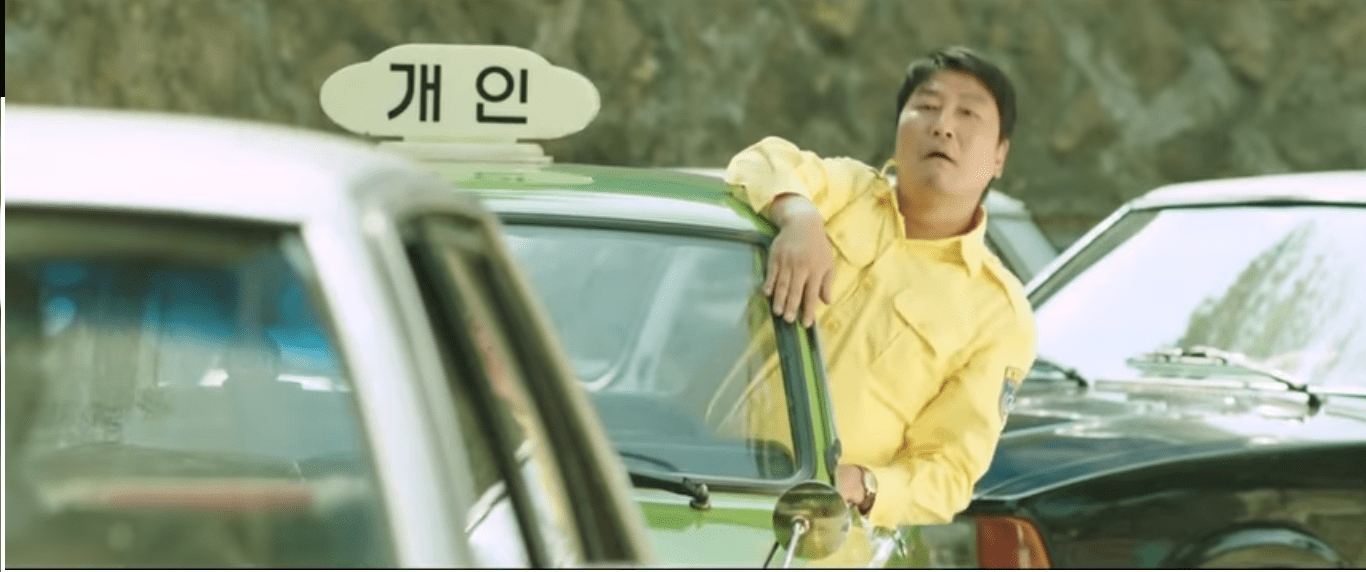The entirely true story of “A Taxi Driver” is one that will pull every single one of your heartstrings. On top of emotional involvement, just knowing that this frightening story was part of South Korean history a mere 37 years ago is bone-chilling and eye-opening.
“A Taxi Driver” is centered around the history of the “Gwangju Uprising” which spanned the short time of May 18th to May 27th in the year 1980. Following the assassination of president Park Chung-hee in 1979, the head of the Defense Security Command, General Chun Doo-hwan, rose to become the un-elected coup leader of the country. On 17th May 1980, Chun expanded martial law to the entire country, supposedly due to rumors of North Korean infiltration into South Korea.
Riots against the rule began around the country, but a group of protesting Chonnam University students in the Southwestern city of Gwangju were suddenly fired upon and beaten to death in an unprecedented attack by government military troops. However, the citizens of Gwangju did the unthinkable at the time and fought back. The people came together to rob local armories, police stations, and walk the streets in protests against the unnecessary deaths caused by the government’s military forces. The violence quickly grew and Gwangju was suddenly cut off from the rest of the country, and the world. Roads were blocked off, phone lines were cut, and news of what was going on was forbidden.

Song Kang Ho (“Snowpiercer,” “The Host”) plays the starring role of Kim Man-seob (who simply is known as Mr. Kim through the film), a widowed taxi driver in Seoul. He takes care of his eleven-year-old daughter on his own and struggles to make ends meet with only his personal taxi service. Mr. Kim hears through the grapevine that there is a traveling foreigner who will pay a large amount to the taxi driver who takes him into Gwangju and he’s in need of the money, so why not take the opportunity?
That foreigner is German reporter Jürgen Hinzpeter (who they refer to as Peter or simply “reporter”) and is played by Thomas Kretschmann (“King Kong,” “Avengers: Age of Ultron”). Having been working in Japan for years, Peter learns from a colleague that Gwangju in South Korea has been blockaded for some reason and no one can get in to find out why. He decides to set off in search of a compelling story and hopes find out what is truly going on.


Peter becomes Mr. Kim’s passenger and they set off to Gwangju, but not without a few roadblocks along the way. After lying their way past the military blockades and Peter sneaking in forbidden recording equipment, they are soon met with the chilling sight of a worn-down city and a truck full of students. On the truck is Gu Jae-sik, who is played by Ryu Jun-yeol (“Reply 1988,” “Lucky Romance”), a student who speaks fairly decent English in comparison to Mr. Kim. Peter takes him on to be his translator as he searches for more footage to shoot of the situation in Gwangju.


Over the course of a day, the Seoul taxi driver and German reporter are stunned by the situation that has risen in the city. Hospitals are filled to the brim with beaten and bloody students and bystanders. Even the city’s taxi drivers no longer charge their passengers which stuns the Seoul driver, Mr. Kim. The riots are still going strong, but are easily beaten each time by the defensive military forces who quickly turn offensive. Word gets out that a reporter has made it into the city, and the citizens decide to work together to help the man gather footage and escape the city so that he can show the rest of the world their situation and send help.
Mr. Kim, who just wished to live a quiet life, finds himself wrapped up in a situation he never wanted to be part of. However, he becomes attached to the people he has met during the journey, including Peter. Peter himself, who is negative and stoic for the majority of the film, also finds himself connecting to the people of Gwangju. A later scene in the movie shows the breaking point of the reporter as he sits in a room surrounded by the bodies of dead, innocent people. He weeps for the country he is not even a part of, and it becomes harder to make himself film the terrible sight. With hopeful words and support from Gwangju’s people, Peter and Mr. Kim continue on and make their way back out of Gwangju and towards Seoul.


The movie is brilliantly shot. During the more action-based riot scenes, they use a loose camera rather than a static one and it puts the perspective of an oppressive situation into first person view. Most of the movie is shot outdoors with natural lighting, keeping the setting realistic and almost documentary-like. It also highlights a specific violent scene in which military troops are chasing the main cast in haunting, red lighting.
We are soon met with death threats at gun-point and a chilling scene of Gwangju citizens having been stripped of their clothing and being beat senseless in an alley. It gets to the point that even when the citizens and students are seen waving white flags of surrender, they are being shot down with weapons in the middle of the street. This is highlighted by chilling music choices that are quiet and haunting.
There’s just enough of a heartwarming connection to the main cast in certain scenes, such as a dinner scene with the family of Gwangju taxi driver Hwang Tae-sool, played by Yoo Hae-jin (“Veteran,” “The King and The Clown”). However, each happy scene seems to be followed by an equally devastating event, keeping the audience sitting on the edge of their seats in worry. Even there to review the film, I personally cried throughout a good 15 minutes of this movie, especially knowing so many innocent people were killed in real life.


At the end of the film, just before the credits rolled, an added bonus is shown through a video clip of the real Jürgen Hinzpeter is shown in his old age.


Overall, I would rate the movie a 9.3 out of 10.
Of course, the English in the flm was awkward and choppy, but purposefully so. It kept the perspective of the difficulties of traveling in a foreign country alone, yet still proved that no language barrier can get in the way of an emotional connection with fellow humans. Perhaps the greatest part of the film was experiencing the sheer amount of character development from Mr. Kim and even Peter, especially knowing this was only over the course of a few days. Overall, this is a film that I loved enough to make me plan to purchase the DVD when it’s released.
The movie, which was a production effort created by Showbox, The Lamp Production, and Well Go USA Entertainment, has also been given a rating of 92% on popular film critic site, Rotten Tomatoes— a rare occurrence! In addition, it set a new record for the fastest Korean movie to sell 7 million tickets in 2017, even beating out sales by the highly-anticipate movie “Battleship Island.” It has raked in over 42 million USD in sales.
“A Taxi Man” is still showing in select theaters around the U.S., so feel free to check it out yourself! In the meantime, check out the trailer below!
CaptainMal has been into Korean entertainment for seven years now, since 2010. She occasionally travels to conventions in her area, showcasing her “Kpop Game Show.” Although her favorite bands are Infinite, Super Junior, and VIXX, she boasts a love for a huge variety of artists. Other than Kpop, CaptainMal loves Disney, 80’s rock, Daft Punk, Gaming, and Orange Juice.
Media: Well Go USA Entertainment, The Lamp Production

